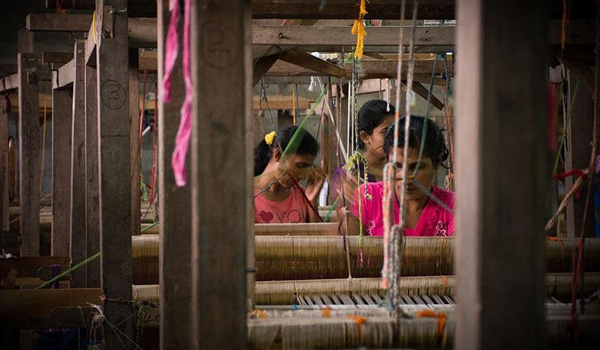
International Handloom Day was celebrated on August7 with leading manufacturer Selyn hosting a week filled with activities at their Flagship Store in Colombo.
“Handloom Week was initiated as an important event to highlight and bring awareness to a core sector in the craft industry of Sri Lanka and to also highlight its potential as a premium export from the country. This year is special for us as we celebrate 30 years as an organization that has effectively contributed to the upliftment of the industry and has positively impacted the artisan community by committing to consistent work and sustainable livelihoods,” Selyna Peiris, Business Development Director of the company said.
The week saw designers Lonali Rodrigo of House of Lonali in a discussion on traditional handloom techniques in the modern world and Vajira Peiris on a live looming session.
Selyn hosted two international panels on the “Future of Handloom” and its relevance to Sri Lanka and the SAARC region. The first discussion on ''Global Trends: From Craft and Heritage''was with Rue Kothari, a London-based design expert and Ruwandika Senanayake, Senior Lecturer on Integrated Design at the University of Moratuwa. This was followed by another discussion on "Craft as the "Sustainable" Solution, Model and Area of Growth: An International Perspective from SAARC to the World'' with Riaz Hamidullah, Bangladeshi ambassador to the Netherlands/former ambassador to Sri Lanka and Patrick Duffy, founder of the Global Fashion Exchange.
Selyna Peiris of Selyn took part in these conversations on the balance between scalability, sustainability and conscious consumption. The conversations were moderated by Professor Robert Meeder, co-founder of the Institute of Future Creations.
‘2021 has been the year of the creative economy, and we have seen a lot of disruption, development and changes to this sector. Additionally, the creative economy goes hand in hand with sustainability, which leads us to examine heritage and how craft and handloom plays a key role in it,’ Prof. Modder said.
Ruwandika Senanayake pointed out that within their education system ‘The craft culture project has been introduced to value the local production processes, and to learn how to handle a craft community by empathizing with the people …. Inspiration is not just from the beauty but should come from within the practice itself.’
Rue Kothari also added from a consumer's point of view, ‘Internationally, the craft industry has been experiencing a growth, as there has been a shift in the consumer demand from generic, mass produced products to bespoke handmade products. Especially young consumers who are more concerned about what they buy and where they buy from.’
In another conversation, Ambassador M. Riaz Hamidullah voiced the dire need to preserve culture by stating that ‘Craft is not simply about the vocation, or just making a livelihood. As seen across Nepal and Afghanistan too, craft is also about identity, substantial income and heritage.’ Responding to the concern, Selyna Peiris highlighted that their current fair and transparent model, will develop to become more transparent with block chain technology being integrated into their supply chain, which means that with the QR code all suppliers will be able to see where and who has made the products, what materials have been used and what the working conditions are, additionally with consent from the artisans, it will show how this model has impacted them and their purchasing powers.
The discussions focused on the potential for handloom not only as a trend in the global fashion and design industry but to identify Sri Lanka’s comparative advantages to jump the curve and lead. Challenges highlighted were the lack of a cohesive and collaborative ecosystem of support and the overall under-value and under appreciation of the product which has led to skill resources being depleted in the country.
Creative couple, Hash and Manga, presented their own interpretation of taking handlooms into the modern world by expressing that ‘Traditions become obsolete if they do not change with time’.
To catch the highlights from International Handloom week by Selyn follow www.selyn.lk or on their social media pages @selynfairtade

Selyna Peiris

Lonali Rodrigo

Hash & Manga
Leave Comments